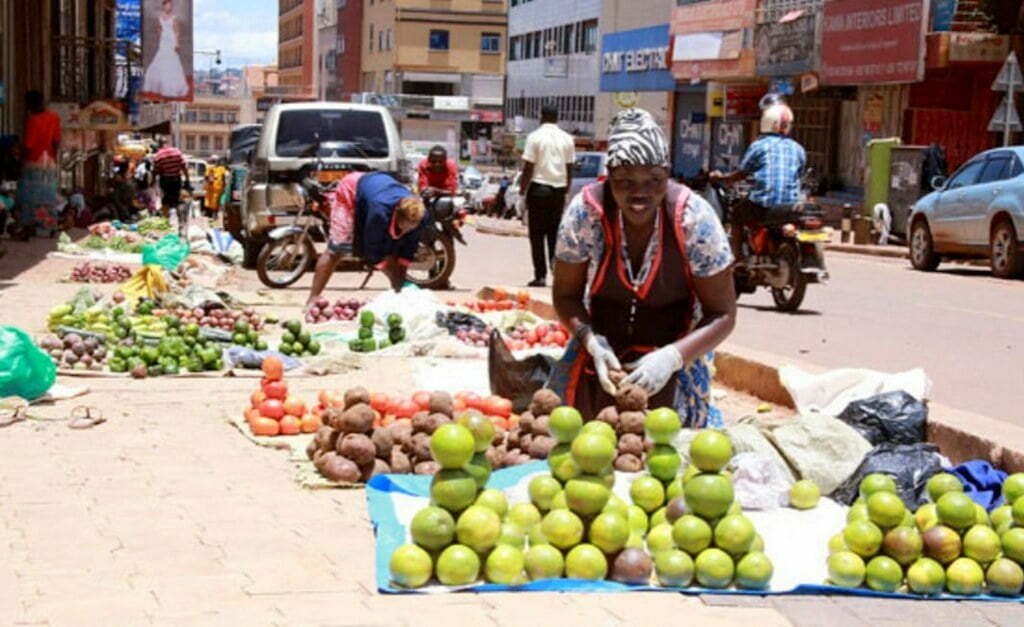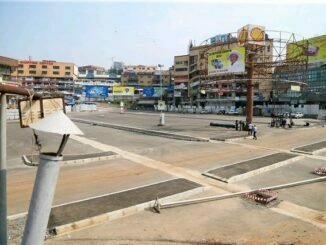
Kampala, Uganda | URN | A less congested and more calm environment returns to Kampala- Uganda, a few weeks after the city authorities enforced operations to remove street vendors and hawkers off the city.
The last such cleanup was conducted by Kampala Capital City Authority (KCCA) under the leadership of Jennifer Musisi. Using law enforcement officers from the Authority, Musisi removed vendors and hawkers off Kampala street, arresting several and confiscating merchandise from many.
Now under the leadership of Dorothy Kisaka, KCCA started the year with intense operations to get vendors off the streets and into the markets. Ordinary police, officers from the Field Force Unit (FFU) and Military police joined law enforcement officers to comb the streets once again. But while many have found footing in the markers, several others still play hide-and-seek with the enforcers.
Viola Kobusobozi, one of the vendors who have insisted on working in the streets, says that while the situation is tense, she cannot afford to take up working space in the markets because of the costs involved. Kobusobozi, a mother of two instead walks around the city with a pack of face masks, some hanging on pegs with the hope that she can still attract buyers.

Kobusobozi defiance comes with a lot of vigilance. As she walks or sits on Kampala streets, she watches closely for any law enforcers and runs into hiding as soon as she spots them to avoid arrest. Every passing minute, she says, security personnel are inspecting the city to ensure that no vendor is left behind.
Our reporter observed about six groups of law enforcers between Namirembe road, adjacent to the new taxi park and Burton street a distance of about one kilometre. Each group has about seven to ten members drawn from the different security groups.
Jessy Sendegeya, who rides a motorcycle along Ben Kiwanuka street says the law enforcers are tough and ruthless while confiscating merchandise and arresting those they find on the streets. These officers, Sendegeya says also walk to the stores in Kampala where street vendors and hawkers keep merchandise from which they sell, and confiscate it.
But besides those who continue to hustle on the streets, hundreds of vendors have now settled in different markets in the City. One such market is Segawa Market located along Mwanga II road, just a few meters from Kisenyi Health Center II.
Segawa was constructed like an ordinary arcade, in a U-format with wide space in the middle. It is part of the open spaces that more than 50 vendors have found space solace in. The floor is well-demarcated to allow for every vendor to have their space while leaving walkways for use by people accessing the market.
Isma Mubiru, the Chairman of Fuba Tukole Hawkers and Vendors Association says when KCCA intensified operations, management at Segawa Market approached them with an offer to take up shops at the market, at no cost for six months and start paying thereafter.

But the vendors, unlike shop keepers who operate in individual enclosed rooms or shops, asked to use part of the open space which has saved them from the running battles they previously engaged in with law enforcers.
But many still say they aren’t making as much money as they did while on the streets. Night Laken, says she would make at least 20,000 Shillings a day working on the street but by 1 pm at the new market, she had only made 2,000 Shillings from selling lemon.
Read Also: KCCA embarks on evicting street vendors to mitigate spread of COVID-19
Laken, a mother of six says they can’t afford well-established markets like Nakasero and Owino because they not only have less capital to compete but have no money to rent space. Although these are public markets, several of the stalls within were sold to vendors who are now asking for money to let anyone occupy them.
Andrew Kasagga, another vendor who equally hasn’t found as many customers yet wishes that KCCA left them to operate on specific streets in the evening when shop owners start closing. He also wants the government to give them capital to grow their businesses and to rent shops.
A few days back during a televised interview, president Yoweri Museveni advised the vendors to get space and work in the markets, adding that they were inconveniencing shop owners yet they don’t pay any tax.



